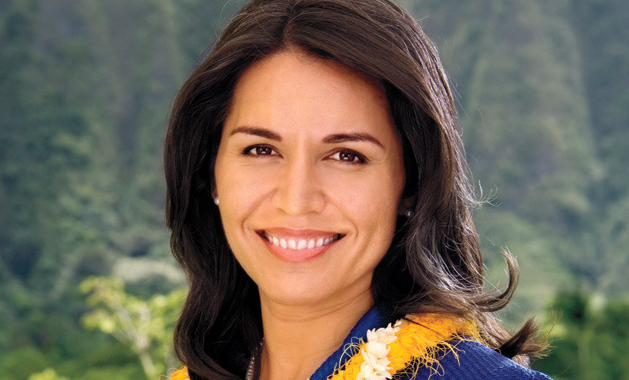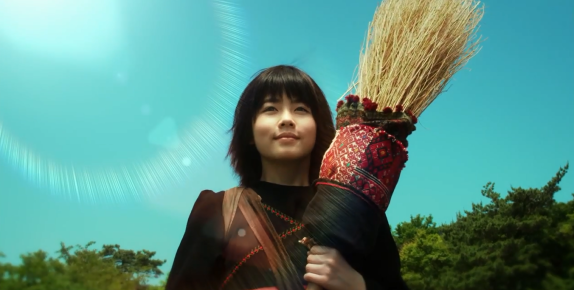Story by Susan Soon He Stanton.
Congresswoman Tulsi Gabbard is a rising political star. The 32-year-old has been nicknamed the “Democrats’ Darling” and is viewed as an embodiment of the Obama era. She’s also one of six representatives born in the 1980s, the first group of millennials in Congress. And while a lot of negative things have been said about millennials, dubbed the “Why-Worry Generation” by The New York Times, Gabbard easily shatters the apathetic stereotype. She is one of the first two female combat veterans, the first Hindu and the first female of Samoan ancestry ever to serve as a member of the U.S. Congress. And though the congresswoman is busy dealing with the chaos of the federal government shutdown this past October, she briefly steps off the floor between votes to speak with Audrey Magazine.
“Congress is starting to reflect the diverse makeup of our country,” says Gabbard by telephone. “It’s an opportunity to bring voice to many different constituencies and people from all around the country who may not have been able to look at Congress before and say, ‘Hey, I can relate to that person.'”
A year into her first term, she laments a dysfunctional government that has failed to deliver on its core functions. “When you talk to people who have been here for decades, they say this is the worst climate that they have ever seen in Congress,” she says. She believes the solution is “more bipartisan friendships like [that of the late Hawaiian Senator] Dan Inouye and [the late Alaskan Senator] Ted Stevens. People who understood what it meant to serve, to put your country and the mission first and work together.”
In an effort to mend a fractured Congress, Gabbard has teamed up with Republican and fellow millennial Rep. Aaron Schock to spearhead the Congressional Future Caucus, the first such caucus dedicated to pragmatic bipartisan solutions with the millennial generation in mind. In an interview with BuzzFeed, Schock said, with the increasing number of representatives under the age of 40, that “helps give the opportunity to make people think more long term. People in their 30s and 40s look at life differently than people in their 60s or 70s.” Gabbard adds that her bipartisan efforts do not mean she will set aside her principles, but it does require Congress to “work together, listen respectfully and discover those areas where we can find workable solutions and bring those about.” She wants people to recognize that “no one gets their way 100 percent of the time, but the same can be said for any relationship or partnership that you have, be it in a business or in the home or in a friendship. It’s about recognizing the diversity of our country, doing our best to work together and making that happen.”
[wp_ad_camp_1]
Gabbard is no stranger to finding the middle ground in political disagreements, even at home. Her pro-marriage-equality stance during her 2012 campaign ran against some of the statements her father, state Senator Mike Gabbard, had said over the course of his career. “I love my parents both very much; it’s no secret we disagree sometimes, surprise surprise,” says Gabbard. However, she adds, the unconditional love between them is “unbreakable.” When she was 15, Gabbard and her father co-founded the Healthy Hawaii Coalition, a nonprofit focused on teaching environmental awareness to children, and to this day they call each other for advice on a variety of issues. Gabbard, who was home-schooled along with her siblings, says her parents encouraged her to be of “service to other people and try to be a positive impact on their lives.”
Her desire “not to be a problem, but to be a part of the solution” motivated her at 21 to knock on doors with homemade black-and-white flyers during her campaign for a seat in the state Legislature. Gabbard won the election in 2002, becoming the youngest person ever elected to the Hawaii Legislature and the youngest woman elected to state office in American history.
In 2004, she decided not to run for a second term and instead voluntarily deployed to Iraq with her National Guard unit, serving two tours of combat duty in the Middle East. This past September at the National Conference on Citizenship, she accepted the Major George A. Smith HOOAH Award, recognizing a veteran who defines citizenship through service to our country, both in uniform and beyond. Not only is Gabbard the first Pacific Islander to receive the award, she is also the first female to be so honored.
Given Gabbard’s career thus far, many may be surprised to know that in her youth she was afraid of public speaking. Discussing feelings of self-doubt as she broke race, age and gender barriers, she offers advice to women who may suffer from “impostor syndrome,” a psychological phenomenon where people can’t seem to feel that they belong or deserve their accomplishments. “The first and most important question that every person should answer for herself is, ‘Why am I doing what I’m doing?'” she says. “If you are motivated by selfish reasons, then you may be faced with some of these issues. This is not just in politics, it’s in business and the military and in all industries.” Gabbard says to view career challenges not as personal advancement but as opportunities for leadership. “When you recognize that it’s not about you, but a responsibility and a privilege that you have, it changes the entire framework of your role and the path that you have ahead of you.”
[wp_ad_camp_2]
It’s something she keeps in mind as she strives to balance the personal with the professional. Surfing, capoeira and vegetarianism are among her eclectic, and some would say, atypical interests. When asked if any of her extracurricular activities ever felt in conflict with her role as a politician, she responds, “I think all of the interests that I have are part of who I am. They are part of my experience or choices that I’ve made in my life.” She continues, “When I go to paddle out for a surf, there’s nothing congressional about it. I am the same person that I was before I was elected, before I went through the campaign, as I am now, and there’s no reason for that to change. Rather than a detraction or something to downplay, every part of who I am helps me to keep balanced and focused so I can do the best job that I can in Congress.”
Indeed, Gabbard values the influence Hawaiian culture has had on her as a person and on her approach to politics. “I carry the Aloha spirit with me, be it in the military or in Congress or in my dealings with people,” she says. “It is ingrained in who I am; it’s what I keep at the forefront. And I know for sure that it is complementing the work that I do.” Referring back to the government shutdown, Gabbard adds, “We need to bring more Aloha into the conversation that we are having so that they can be substantive and constructive.”
And with that, Congresswoman Gabbard excuses herself to return to the floor to vote, certain to bring some of that much-needed Aloha spirit to Congress.
This story was originally published in our Winter 2013-14 issue. Get your copy here.







